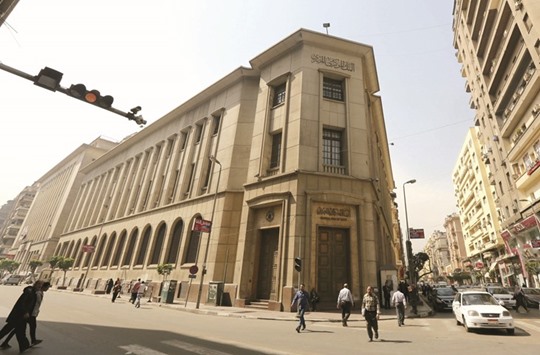Egypt’s central bank will offer $1.5bn today in its third special foreign exchange auction of the week, part of an effort to crush the currency black market and stabilise the Egyptian pound a day after a major devaluation.
Egypt devalued the pound on Monday to 8.85 pounds to the dollar from 7.73 pounds and announced that it would shift to a more flexible exchange rate. The equity market rallied on the news.
Today’s auction would bring the total amount of dollars injected into the banking system through special auctions in the past two weeks to $2.4bn, equivalent to 15% of the central bank’s net foreign reserves.
“The aim of offering $1.5bn tomorrow is to completely finish off the black market,” a central bank source said. Egypt has been facing an acute foreign currency shortage since a 2011 uprising drove away tourists and foreign investors, key earners of hard currency. Its reserves have more than halved since before 2011 to $16.5bn in February, weighing heavily on the pound.
The central bank did not say where the dollars for its exceptional auctions were coming from, raising speculation that Egypt was expecting to receive a major loan or grant from abroad or had decided to further tap its reserves.
The central bank has said it expects to rebuild its reserves to $25bn by the end of 2016. “The central bank may be using existing resources because it is more comfortable now to use them,” the head of equity research at Beltone Financial, Hany Genena, said.
This week’s devaluation, welcomed by economists and bankers, had helped narrow the gap between the official and black market rate, which had depreciated to unprecedented levels near 10 to the dollar in recent weeks.
But the gap widened again yesterday to 9.6 to the dollar.
“Demand is strong on the dollar since the devaluation of the pound,” one black market trader said.
One banker said this was because importers who had opened letters of credit and ordered shipments based on the old rate had scrambled to the black market to cover their shortfall after the pound was devalued.
Once they receive enough dollars to cover their forex overdrafts, the market should move toward equilibrium, he said.
Today’s auction will be the latest in a slew of measures announced by Central Bank Governor Tarek Amer in recent weeks and months as he engineers Egypt’s shift toward a more flexible exchange rate regime aimed at restoring confidence and luring back foreign investors. The central bank has eased capital controls that were imposed by Amer’s predecessor in February 2015 that had sucked up forex liquidity and made it harder for importers to open letters of credit and clear shipments at the ports.
Seeing to attract foreign currency, Egypt’s three main state-owned banks have launched dollar-denominated certificates of deposit aimed at Egyptians living abroad.
On Monday Egypt’s top two state banks, the National Bank of Egypt and Banque Misr, also said they would offer Egyptian pound investment certificates with a 15% yield in return for foreign currency.
The main two state banks also began offering callable dollar options to lure foreign investors concerned about forex risks back into government treasuries. Foreigners’ holdings of local treasury bills have fallen well below $1bn from over $10bn at the end of 2010, bankers say.

The Central Bank of Egypt’s headquarters is seen in Cairo. The bank will offer $1.5bn today in its third special foreign exchange auction of the week, part of an effort to crush the currency black market and stabilise the Egyptian pound a day after a major devaluation.
